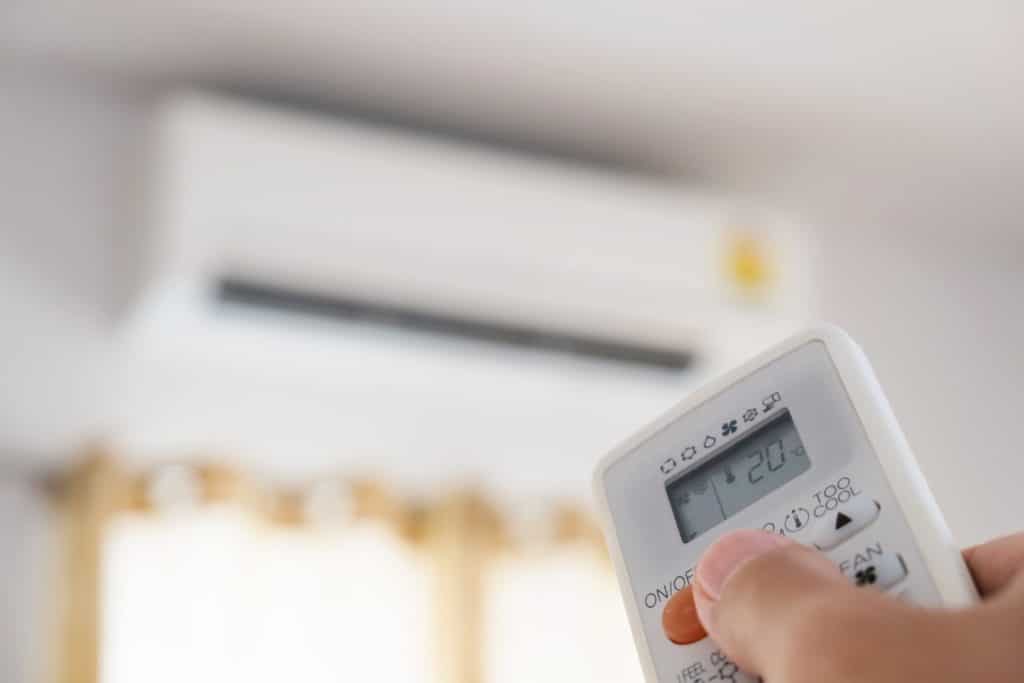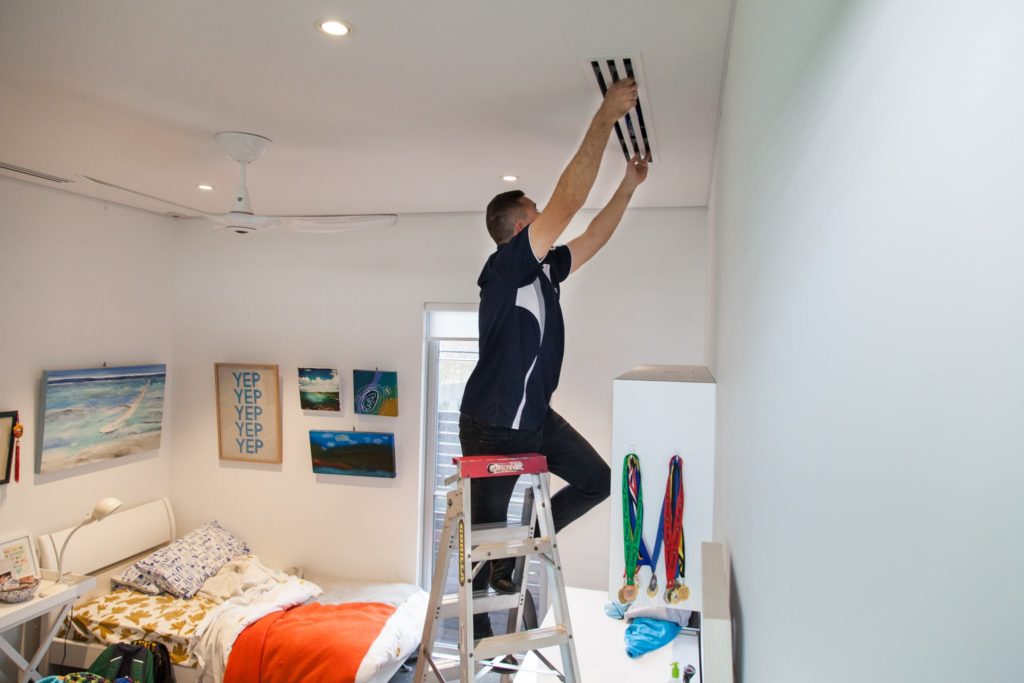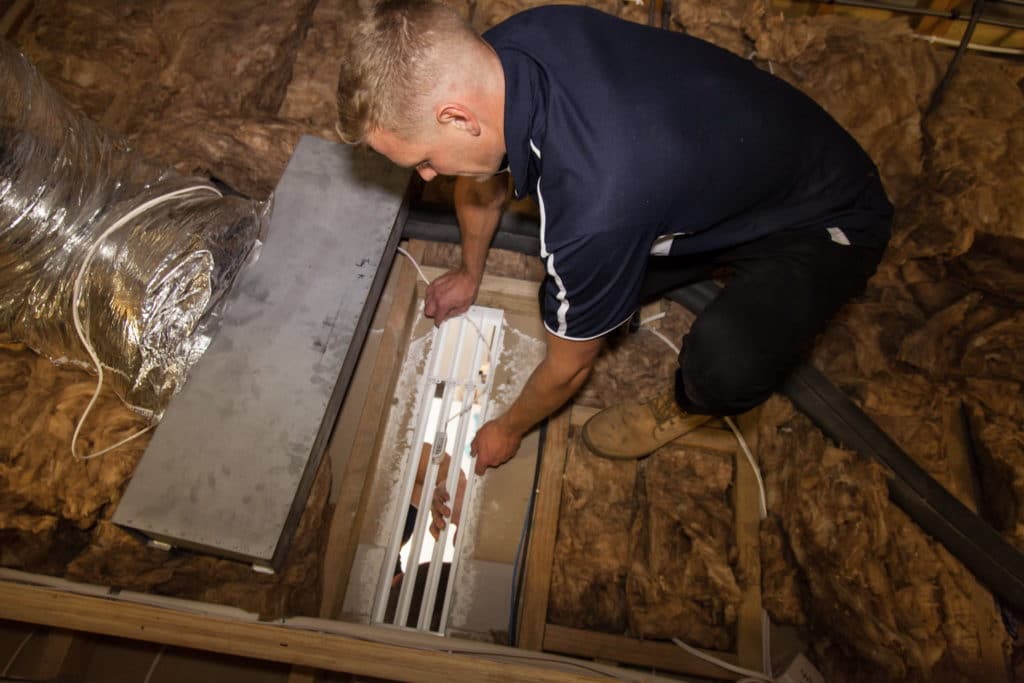It’s that time of year again – the winter chill starts to settle in, and thousands of families begin to worry about how they are going to heat their home. We all want to live comfortably over winter, but without racking up a huge power bill. So, what is the most cost-effective heating solution?
One question that gets asked a lot is ‘Are split systems expensive to run for heating?’
In the past, the debate was always about gas vs electricity and which was cheaper. Now with huge numbers of West Australians installing solar and the release of more efficient heating units, many people are sticking with split systems and reverse cycle ducted air conditioning.
So, which is the best heating solution for you this winter?
How do Split System Air Conditioners work?
Split system air conditioning is made up of indoor and outside units. The two components are connected through the house by copper piping and electric cable.
When working as a heater during the winter months, a heat exchanger uses thermal energy from the refrigeration process to heat the room. . The heat then passes through the indoor unit via the fan blower into the room. In the summer, when used for air conditioning, the split system works in the opposite way, expeling that thermal heat energy outside.
What is a Multi-Split System Air Conditioner?
Multi-split systems allow you to have multiple indoor units using the same outdoor unit. This is perfect if you need to heat different rooms or different floors. Each unit can be individually controlled and set to whatever temperature you desire.
How Much Does it Cost to Run a Split System Air Conditioner?
One great benefit of split system air conditioners is their upfront price. In comparison to other reverse cycle systems, the split system is very affordable to install starting from $1,900 for a single unit fully installed.
Split system installation is also quite quick. Often the unit can be installed and ready to use within a few hours. However, while split systems work very well for small homes, they may not always be suited to larger properties.
That said, a split system’s overall efficiency is outstanding. While a gas-powered heater can only be 100% efficient, a split system’s efficiency can reach 600%.
Why? Because gas heaters use a lot of energy to turn electricity into heat. A split system, however, moves heat from one place to another. Because heat is easy to collect and carry, a split system air conditioner can move a lot more heat energy than the electric energy it uses.
Due to this outstanding efficiency, the average household in Perth can save between 39% – 70% of their heating bill with an installed split system.
The Pros and Cons of a Split System Air Conditioner
Pros:
- Split systems are easy to install but must be installed by a qualified installer. Some split systems can be up and running within a few hours.
- They’re quiet indoors. As the fan and condenser are in the outside units, split system air conditioners are extremely quiet in the house.
- With a multi-split system, you can heat different rooms in your home. Even better, split systems are entirely controlled by you. You can choose how many rooms are heated and when – meaning you won’t let any energy go to waste.
- They’re cost-effective. Although split system air conditioning may be more expensive than a ducted gas heater, you’ll save money on energy use over time. Natural gas wastes so much energy converting to heat, the cheaper costs per power unit are hardly worth it.
- There is no risk of carbon monoxide being emitted into your home. Gas heaters lose 30% of air going through a flue to prevent carbon monoxide. However, these heaters are prone to breakages and must be carefully monitored and maintained. A split system air conditioner can’t produce CO at all.
- It’s heating and cooling in one system. Gas heaters can only provide one thing – heat. With a split system, you can set the perfect temperature all year round.
- No risk of house fires. Gas heaters are a huge reason for home fires during winter months.
Cons:
- Some people don’t like the aesthetic look of ducted units and prefer installing reverse cycle air conditioning vents. A split system also requires you to have an outdoor unit which, if you have a small backyard, may take up some vital space.
- They must be installed by a professional to ensure the unit performs as expected.
What is Ducted Reverse Cycle Air Conditioning?
Instead of using multiple indoor units around the house, ducted reverse cycle air conditioning distributes heat throughout the home via ducts and vents.
The great thing about reverse cycle ducted air conditioning is the ducts are usually tucked out of sight. Many people like the idea of using a split system but prefer the aesthetic appeal of a ducted reverse cycle system.
Just one ducted reverse cycle compressor unit can heat (or cool) an entire home. Several ducts are hidden throughout the house, and this system can distribute air through a 2 or 3 storey home very effectively.
Ducted reverse cycle systems are the better option for larger homes overall. A split system would require multiple wall units, all needing to be installed and maintained regularly.
Similar to split system units, ducted air conditioning can be set up to service multiple zones separately. You can choose what rooms are heated and when.
How Much Does it Cost to Run a Ducted Reverse Cycle Air Conditioner?
It’s not surprising that ducted air conditioning has a higher upfront cost than a split system. The indoor and outdoor units are bigger, and the installation process is more involved.
With that said, 2-3 split system units can cost roughly the same amount as one ducted air system. As all units require maintenance from time to time, it may work out cheaper in the long run. Running the ducted unit can be cheaper day to day, especially if you choose a 7-star model.
The Pros and Cons of Ducted Reverse Cycle Air Conditioners?
Pros:
- They’re permanent and effective. Ducted air conditioning is the most heavy-duty of the air conditioning systems.
- They’re even quieter than split system units. When a split system unit starts rattling, it’s a sign something’s going wrong. Ducted systems need less maintenance than a split system overall.
- They’re discreet. Unlike a split system, a ducted system only requires a vent in each room.
- They add value to your property. As an expensive and permanent feature, ducted air systems are coveted across Australia. If you choose to sell your home, ducted air will certainly be a selling point!
- They can be more economical to run than split systems. Also, depending on the size of your house, it could be cheaper to install one system over many. With a new home being built, or an old one being renovated, a ducted air system is also easier to install.
- They’re eco-friendly. In comparison to ducted gas heaters, ducted air systems produce two-thirds less greenhouse gas emissions.
Cons:
- Reverse cycle ducted air conditioning systems are more expensive upfront than a split system unit.
- If you don’t have a zoning function, you’ll be heating the whole house, which can be costly. If you only need to heat a few rooms, a split system would be a better option.
- You’ll need adequate roof space. Some systems can be large and require a certain amount of space for installation.
Is Ducted Reverse Cycle or a Split System Best for Me?
Both ducted and split systems have their pros and cons. One thing is clear, however – both are cheaper, more efficient and more eco-friendly than gas options.
When it comes to installing your air conditioning and heating units, “Ducted vs Split”, it comes down to a few factors such as:
- How much you can afford to spend upfront
- How big your home or building is
- How many rooms you need to heat?
If you want to find out more about heating your home, we can help you.
Perth City Air is one of Perth’s leading air conditioning and heating experts and can recommend the most efficient, reliable, and affordable air conditioning unit for your premises.
For a no-obligation free quote, contact us today.








